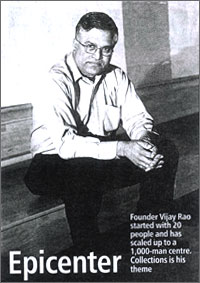 Call
centre debutantes like Spectramind,
Daksh and EXL have all grown up. (Yes!
We are crowing again. We are compulsive.
These were the start-ups we featured
in one of our covers very early on.)
Many of them are now big boys (or
girls?). Their ability is a given
– and there is a price war on.
Spectramind apparently won the $10-million
a year (according to market rumours)
Delta Airlines contract solely on
the price factor. A computer manufacturer
that outsourced tech support also
gave business to a second supplier
with a 20% price drop in just one
year. Now the computer maker is scaling
up its own support centre in Bangalore
rapidly. In just a year it has grown
to become 2,000-people strong. Anyone
who wants business from it now, will
have to compete with the in-house
centre on costs. Call
centre debutantes like Spectramind,
Daksh and EXL have all grown up. (Yes!
We are crowing again. We are compulsive.
These were the start-ups we featured
in one of our covers very early on.)
Many of them are now big boys (or
girls?). Their ability is a given
– and there is a price war on.
Spectramind apparently won the $10-million
a year (according to market rumours)
Delta Airlines contract solely on
the price factor. A computer manufacturer
that outsourced tech support also
gave business to a second supplier
with a 20% price drop in just one
year. Now the computer maker is scaling
up its own support centre in Bangalore
rapidly. In just a year it has grown
to become 2,000-people strong. Anyone
who wants business from it now, will
have to compete with the in-house
centre on costs.
There is commoditisation. Getting
customers is no longer a problem.
They walk in themselves. It is now
an execution game – employ the
best technology, get global scale
and operate at the lowest cost.
Sanjeev Aggarwal of Daksh would still
argue that it is possible to differentiate
even in a market such as this. Even
here, consultative customer support
can fetch a bigger price. “For
example, if a call centre agent is
talking to the customer of a telecom
company on which plan he has to be
on and putting him on to the right
one, and activating his connection.
It’s very high value add compared
to telemarketing.” Aggarwal’s
company has 800 people serving just
one telecom customer and does everything
from putting customers on to plans
and billing to provisioning a new
service. Including Daksh, the telecom
giant has 19 such centres across the
globe.

But ask him if there is a place for
the late walk-in and the answer is:
“No, They have to find a niche.”
This party is no longer open to the
rookies, but the global big boys,
save Convergys and European company
7C, are yet show up. They can still
find space to salsa. This party is
what the market calls a “horizontal
play.” They will take any calls
or make any calls.
The theme parties, however, are just
about beginning. The third party business
process outfits in India are all very
small, like the 300-strong India Life
Hewitt. Even big boys like Spectramind
are doing very little of that. The
biggest so far in WNS with 3,000 people,
It was spun off by British Airways
and funded by Warburg Pincus. But
that is exception. Most of the back
office work that is happening now
is an captive centres of large companies
like Axa Insurance and Standard Chartered
Bank.
But in the queue are several players.
According to Pijush Sinha of Avendus
Advisors, the four things you need
to enter in this business are domain
or process knowledge, customer access,
market reputation and capital base.
The last three is what several large
Indian companies like Vysya Bank and
IT services have, and want to trend
on. NIIT, Cognizant Technology Solution,
Patni, Datamatics and even the tech
brahmin Hughes software, have all
announced plans.
The global IT biggies, which have
all four aplenty are coming in early
this time. IBM, EDS and CSC are putting
up business process outsourcing centres
here.
However, domain expertise is in short
supply. In short, you need to know
the customer’s business. There
are a few companies like Kale Consultant
who know the airlines reservations
business already because it built
that technology in the first place.
But most players like India Life Hewitt
started small, built templates and
are now ready to scale up. But since
this game is gathering speed, you
need to learn the tricks first.
|